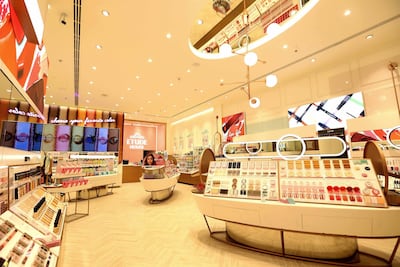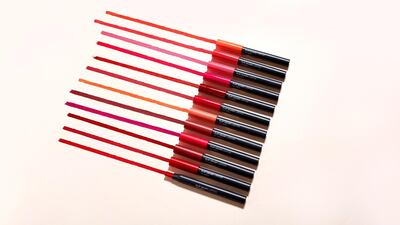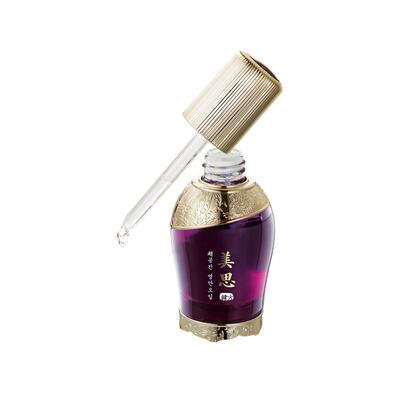South Korean skincare and grooming products have been making inroads in the mainstream beauty industry over the last few years, following the launch of bigwig brands Innisfree and Sulwhasoo in the United States. Popular products such as BB creams, and unusual ingredients, such as snail slime, which have been part of K-beauty for decades, also trailed into the West recently.
Then, towards the end of last year, South Korea's biggest cosmetics manufacturer, AmorePacific, announced that it was revamping its products to "suit Muslims and darker-skinned women ... with a range that takes into account skin tones, the region's humidity and the need for Muslim women to wash their face five times a day before prayers". Accordingly, Etude House – one of the make-up brands under the AmorePacific umbrella – opened its doors in Dubai Mall last month, its first store in the Middle East.

The appeal of Korean cosmetics
Popular for experimentative ingredients and an awe-inspiring 10-step ritual, K-beauty has well and truly arrived in the UAE, with stores such as Sephora and The Face Shop increasingly adding to their stock of products from South Korean skincare and make-up brands. While cleansing, toning and moisturising are the three basic steps in most skincare regimes, K-beauty involves doing the following: double cleansing, first with an oil-based cleanser and then with a foaming water-based one; exfoliation; using a hydrating toner to balance the pH levels; applying an essence or first oil, which is a watered-down serum that acts as a slim first layer before the face mask; putting on face oils or serums as the base; slathering on a sheet or any other hydrating mask for 15 to 20 minutes before washing; applying eye cream; followed by a full face moisturiser; and finally, before you head out, SPF.
“Innovative ideas, formulas and products help keep Korean cosmetics relevant,” says Alfiya Saifuddin, managing director of beauty and cosmetics at Fakhree Al Hindi, the distributors of Missha products in the UAE. “The beauty brands also implement a shorter product-development cycle compared with international players, which helps them respond to evolving consumer demands. And these brands were one of the first to leverage the growing influence of digital media to engage with their customers,” she says.
K-beauty product packaging
Rajesh Bhaskaran, brand manager of The Face Shop UAE, is a fan of what he calls the “genius packaging” of K-beauty products. “Many of the formulations come in never-seen-before textures, which appeals to browsers, and the playful packaging not only looks good, but also often enables easier application. Most importantly, though, Korean beauty heritage is steeped in natural ingredients, passed down through the generations.”
Ick factor aside, when we tried the Tony Moly snail slime mask, it resulted in visibly brighter and plumper skin, while the Misa Cho Gong Jin cream lived up to its promise to hydrate and moisturise thanks to the presence of gongjinbichaekdan, a combination of black ginseng and the Rehmannia glutinosa herb. "Korean beauty brands have explored every possibility in terms of imaginative ingredients, from snail slime, and red and black ginseng, to egg extract, bee pollen, lotus seeds and medicinal ru-trogen herbs," says Saifuddin, suggesting that the fad for all things natural has always been at the core of the K-beauty proposition.
Korean skincare expert Alicia Yoon, who sources products for a number of international chains though her company Peach & Lily, sheds light on the daunting 10-step skincare routine. “Contrary to what’s often reported, the routine isn’t necessarily 10 steps long; it can be five or even 15. For example, you don’t have to exfoliate or apply a mask every day, it all depends on your skin’s needs,” she says.
Skincare rituals
Likewise, if you don't have any make-up on, a single cleanse will suffice, while many products now promise dual results, such as a moisturiser with SPF. "Truly understanding your own skin is a big focus of K-beauty, and paying attention to ingredients helps you identify patterns that your skin likes or dislikes. Staying on top of your skincare game means understanding what works for you. The 10-step process simply indicates the multilayer nature of the ritual, which goes back to the Korean philosophy of gentle and long-term focus," Yoon says.
It's not all hunky-dory, though. Earlier this month, AmorePacific recalled several cosmetics, including concealers and eyebrow pencils, from its overseas boutiques, which reportedly exceeded the permissible level of heavy metals. The company has since apologised, and promised to retrieve all products with excess antimony and provide a refund. While such metals are approved of – and indeed necessary for cosmetic purposes – by Food and Drug Safety authorities, overuse could cause itchy eyes and gastrointestinal disorders. All of which goes to prove that international attention can be a double-edged sword, and that as consumers we may be best following Yoon's advice that, fads and fashion reports aside, self-education is the only way when it comes to any beauty buy.



